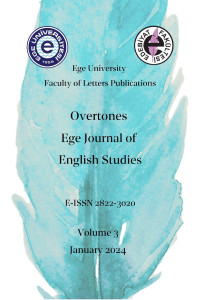Abstract
This article examines Margaret Atwood’s trilogy, comprising Oryx and Crake, The Year of the Flood, and MaddAddam, through the lens of ecologically oriented postmodern thought and aims to reveal that the
trilogy encompasses both textualist and realist orientations. The primary focus is to underline Atwood’s unconventional choice of placing language and its related concepts at the heart of her speculative fiction and demonstrate that she uses its dual role as a tool for both postmodern manipulation and ecocritical awareness regarding our perception of realities. The trilogy navigates scientific, environmental, and literary themes and shifts the focus from facts to narratives emphasising the centrality of language and ultimately underscoring the significance of stories in discovering and shaping our worldview. Embracing an ecocritical postmodern stance, Atwood’s trilogy underlines the need for a re-evaluation of nature/culture and human/nonhuman dichotomies and a reconstructive approach to adopt in the intricate process of meaning making.
Keywords
postmodern ecocriticism science fiction language narrativity Atwood Oryx and Crake The Year of the Flood Maddaddam
References
- Atwood, Margaret. Oryx and Crake. New York: Anchor Books, 2004.
- ———. The Year of the Flood. London: Virago Press, 2010.
- ———. MaddAddam. London: Virago Press, 2014.
- Berger, John. “Why Look at Animals?” in About Looking. New York: Pantheon, 1980. 1-28.
- Butler, Christopher. Postmodernism: A Very Short Introduction. Oxford: Oxford UP, 2002.
- Eco, Umberto. Postscript to The Name of the Rose. Trans. William Weaver. San Diego: Harcourt Brace Jovanovich, 1984. <https://archive.org/details/postscripttoname0000ecou/page/n1/mode/2up>.
- Garrard, Greg. Ecocriticism. London: Routledge, Taylor & Francis e-Library, 2004.
- Hammill, Faye. “Margaret Atwood, The Handmaid’s Tale.” in A Companion to Science Fiction. Ed. David Seed.
- Malden: Blackwell Publishing, 2005. 521-33.
- Haraway, J. Donna. “A Cyborg Manifesto: Science, Technology, and Socialist-Feminism in the Late Twentieth Century.” in Simians, Cyborgs, and Women: The Reinvention of Nature. New York: Routledge, 1991. 149-181.
- Howarth, William. “Some Principles of Ecocriticism.” in The Ecocriticism Reader: Landmarks in Literary Ecology. Eds. Cheryll Glotfelty and Harold Fromm. Athens: U of Georgia P, 1996. 69-91.
- Hutcheon, Linda. A Poetics of Postmodernism: History, Theory, Fiction. New York: Routledge, (1988) 2003.
- Luntley, Michael. Reason, Truth and Self: The Postmodern Reconditioned. Taylor & Francis e-Library, 2003.
- Lyotard, Jean-François. The Postmodern Condition: A Report on Knowledge. Trans. Geoff Bennington and Brian Massumi. Minneapolis: U of Minnesota P, 1984.
- McDowell, Michael J. “The Bakhtinian Road to Ecological Insight.” in The Ecocriticism Reader: Landmarks in Literary Ecology. Eds. Cheryll Glotfelty and Harold Fromm. Athens: U of Georgia P, 1996. 371-91.
- Oppermann, Serpil. “Theorizing Ecocriticism: Toward a Postmodern Ecocritical Practice.” Interdisciplinary Studies in Literature and Environment 13.2 (2006): 103-28.
- Rueckert, William. “Literature and Ecology: An Experiment in Ecocriticism.” in The Ecocriticism Reader: Landmarks in Literary Ecology. Eds. Cheryll Glotfelty and Harold Fromm. Athens: U of Georgia P, 1996. 105-23.
- Sheehan, Paul. “Postmodernism and Philosophy.” in The Cambridge Companion to Postmodernism. Ed. Steven Connor. New York: Cambridge UP, 2004. 20-42.
- Waugh, Patricia. Metafiction: The Theory and Practice of Self-Conscious Fiction. London: Routledge, Taylor & Francis e-Library, (1984) 2001
Abstract
References
- Atwood, Margaret. Oryx and Crake. New York: Anchor Books, 2004.
- ———. The Year of the Flood. London: Virago Press, 2010.
- ———. MaddAddam. London: Virago Press, 2014.
- Berger, John. “Why Look at Animals?” in About Looking. New York: Pantheon, 1980. 1-28.
- Butler, Christopher. Postmodernism: A Very Short Introduction. Oxford: Oxford UP, 2002.
- Eco, Umberto. Postscript to The Name of the Rose. Trans. William Weaver. San Diego: Harcourt Brace Jovanovich, 1984. <https://archive.org/details/postscripttoname0000ecou/page/n1/mode/2up>.
- Garrard, Greg. Ecocriticism. London: Routledge, Taylor & Francis e-Library, 2004.
- Hammill, Faye. “Margaret Atwood, The Handmaid’s Tale.” in A Companion to Science Fiction. Ed. David Seed.
- Malden: Blackwell Publishing, 2005. 521-33.
- Haraway, J. Donna. “A Cyborg Manifesto: Science, Technology, and Socialist-Feminism in the Late Twentieth Century.” in Simians, Cyborgs, and Women: The Reinvention of Nature. New York: Routledge, 1991. 149-181.
- Howarth, William. “Some Principles of Ecocriticism.” in The Ecocriticism Reader: Landmarks in Literary Ecology. Eds. Cheryll Glotfelty and Harold Fromm. Athens: U of Georgia P, 1996. 69-91.
- Hutcheon, Linda. A Poetics of Postmodernism: History, Theory, Fiction. New York: Routledge, (1988) 2003.
- Luntley, Michael. Reason, Truth and Self: The Postmodern Reconditioned. Taylor & Francis e-Library, 2003.
- Lyotard, Jean-François. The Postmodern Condition: A Report on Knowledge. Trans. Geoff Bennington and Brian Massumi. Minneapolis: U of Minnesota P, 1984.
- McDowell, Michael J. “The Bakhtinian Road to Ecological Insight.” in The Ecocriticism Reader: Landmarks in Literary Ecology. Eds. Cheryll Glotfelty and Harold Fromm. Athens: U of Georgia P, 1996. 371-91.
- Oppermann, Serpil. “Theorizing Ecocriticism: Toward a Postmodern Ecocritical Practice.” Interdisciplinary Studies in Literature and Environment 13.2 (2006): 103-28.
- Rueckert, William. “Literature and Ecology: An Experiment in Ecocriticism.” in The Ecocriticism Reader: Landmarks in Literary Ecology. Eds. Cheryll Glotfelty and Harold Fromm. Athens: U of Georgia P, 1996. 105-23.
- Sheehan, Paul. “Postmodernism and Philosophy.” in The Cambridge Companion to Postmodernism. Ed. Steven Connor. New York: Cambridge UP, 2004. 20-42.
- Waugh, Patricia. Metafiction: The Theory and Practice of Self-Conscious Fiction. London: Routledge, Taylor & Francis e-Library, (1984) 2001
Details
| Primary Language | English |
|---|---|
| Subjects | Literary Studies (Other) |
| Journal Section | Research Articles |
| Authors | |
| Publication Date | January 22, 2024 |
| Submission Date | September 15, 2023 |
| Published in Issue | Year 2024 Issue: 3 |


